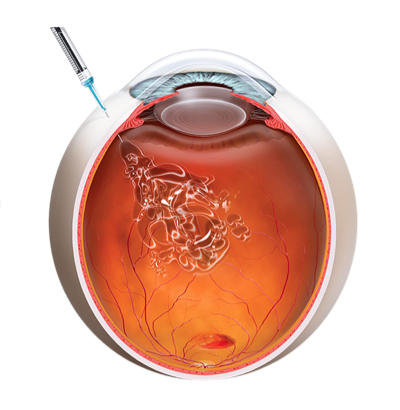EYE INJECTIONS
Intravitreal Injections
An intravitreal injection is a procedure to place a medication directly into the space in the back of the eye called the vitreous cavity. The procedure is usually performed by a trained eye specialist in the clinic.
What Are Eye Injections Used For?
Intravitreal injections are used to administer medications to treat a variety of retinal conditions.
- Age-related macular degeneration (AMD)
- Diabetic retinopathy
- Retinal vein occlusion
- Diabetic retinopathy
- Uveitis
- Endophthalmitis
- Retinitis
What Kind Of Drugs Can Be Given By Intravitreal Injection?
- Anti-VEGF Medications
- Steroid Medications
- Antibiotics, antiviral and antifungal medications
The Injection Procedure
First, the eye and eyelids are anesthetized using drops or gel so the injection doesn’t hurt.
The eye and the eyelids are then cleaned, using povidone-iodine to kill bacteria that live around the eye and to reduce the risk of infection. Once the eye is prepped for injection, you will be asked to look in a particular direction depending on the location of the injection while the medicine is injected through the white part of the eye with a very small needle (Figure 1). Patients may feel pressure, with little or no pain during the injection. The injection is over in less than 20 seconds and the entire procedure take about 10-15 minutes.

What About Complications?
Severe complications are very rare with intravitreal injections.
These include:
- Infection in the eye or endophthalmitis
- Inflammation in the eye
- Bleeding into the vitreous gel (vitreous hemorrhage)
- Retinal detachment
After The Injection
There are usually no restrictions following the injection apart from avoiding potential contamination of the eye and not rubbing the eye. However, you may experience:
- Eye pain or discomfort
- Increased floaters in the first 1-2 days
- Increased sensitivity to light
- Decreased vision
Artificial tears will be given after the injection to help ease symptoms of dryness and surface irritation.
A follow-up visit with your ophthalmologist will be scheduled according to the treatment regimen for your condition.

